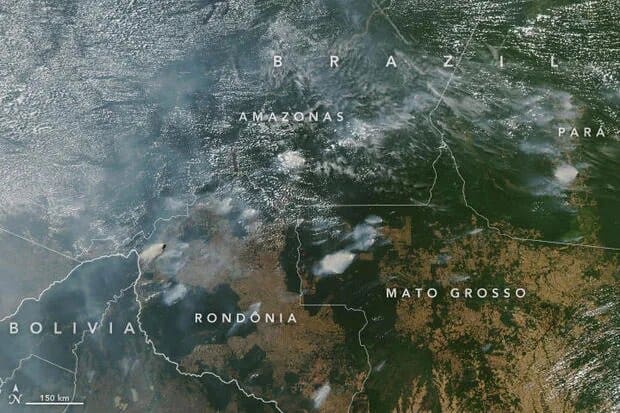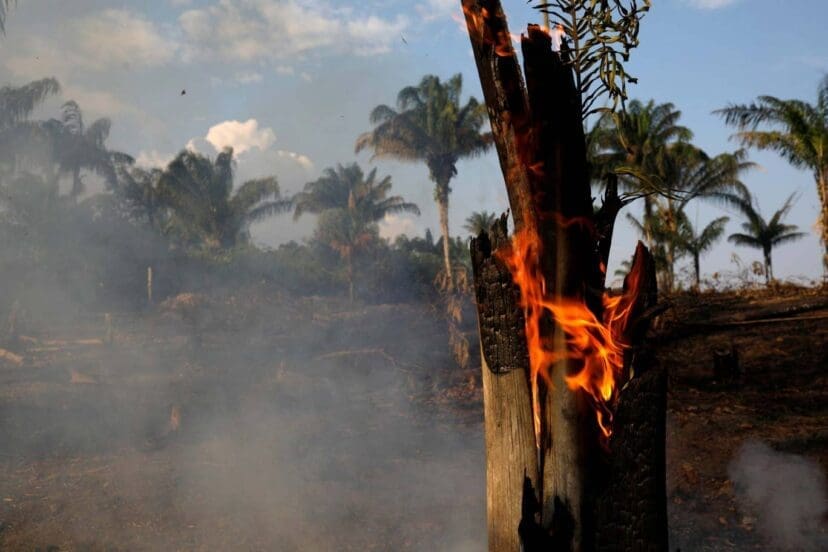Wildfire’s ravaging the world’s largest rainforest have caused so much smoke that it has blocked out the sun and plunged parts of Brazil, neighbouring the Amazon rainforest, into darkness.
The Amazon rainforest, extends into 9 different countries including: Colombia and Peru with the majority (60%) covering northwestern Brazil. The forest has suffered a record number of blazes this year – the National Institute for Space Research (INPE) has detected 72,843 fires so far in 2019, 83 percent higher than last year.
Reuters reported that INPE had spotted 9,507 forest fires, mostly in the Amazon basin, since Thursday August 15.

Satellite images released by NASA show smoke smothering the South American regions, as the infernos rage on.
Sao Paulo was plunged into darkness, as smoke from more than 1,700 miles away saw ‘day turned into night’ across the city.
The National Institute of Meteorology said the city is engulfed ‘within a cloud’.

Helena Balbino, an Inmet weatherperson, said:
This is because of this convergence of such different masses. The cold
front of the capital, coupled with the mild temperatures coming from the
ocean and the warm inland wind, cause this turbulence and this has
lowered the level of the cloud. So we are inside a cloud
Josélia Pegorim, Climatempo meteorologist, told Globo:
The smoke did not come from fires from the state of Sao Paulo, but from
very dense and wide fires that have been going on for several days in
Rondônia and Bolivia. The cold front changed the direction of the winds
and transported this smoke to Sao Paulo.
Here in the Greater Sao Paulo region we had the combination of this
excess humidity with the smoke, so it gave this appearance in the sky.
As a result of the relentless fires, Amazonas declared an emergency in the south of the state and its capital Manaus, which is on the border with Peru, has been on environmental alert since Friday.

As one of the world’s biggest carbon stores, the Amazon rainforest is a huge asset in the fight against climate change. By absorbing massive amounts of carbon dioxide emissions, through its millions of trees, the forest slows down the pace of global warming.
The area hasn’t been prolific for wildfires in the past, but increased human activity – farmers illegally deforesting land for cattle ranching, for example – has led to the spike in fire numbers.
The dry season cannot be the reason for wildfires, according to INPE researcher Alberto Setzer.
As reported by Reuters, Setzer said:
There is nothing abnormal about the climate this year or the rainfall in
the Amazon region, which is just a little below average.
The dry season creates the favorable conditions for the use and spread of
fire, but starting a fire is the work of humans, either deliberately or by
accident.

President Jair Bolsonaro recently fired the head of INPE, Ricardo Galvao, over damning deforestation data, claiming they were inaccurate. Since taking office in January, he’s vowed to develop the Amazon for farming and mining.
Bolsonaro said:
I used to be called Captain Chainsaw. Now I am Nero, setting the Amazon
aflame. But it is the season of the queimada.
The quemida – translated as ‘burned’ – is the season in which farmers use fire to clear land.
Bolsonaro added he is ‘waiting for the next set of numbers, that will not be made up numbers. If they are alarming, I will take notice of them in front of you.’
